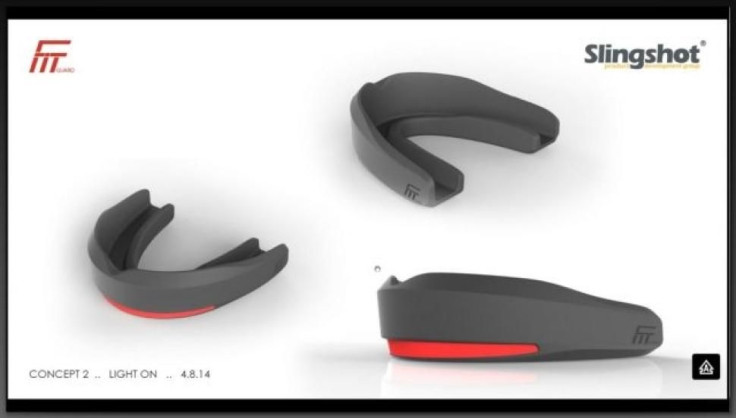Mouth Guard Technology Could Save Students From Concussions And Other Sports Head Injuries

A smart mouth guard has developed on the heels of a national campaign to raise awareness for youth sports head injuries. The new, sensory equipment, the Force Impact Technologies Guard (FITGuard), has the ability to tell athletes when to it’s time to take a rest after a hard hit.
The technologically-enhanced mouth guard can still effectively protect the teeth as any normal mouth guard is expected to, while also being able to assess the degree of damage an athlete endures when they take a hit. "[The FITGuard] will allow parents, coaches and leagues to follow their normal concussion protocol while having some quantitative data to support their conclusion," said co-developer Anthony Gonzales in his product's promotional video.
A bright and boldly displayed light indicates the level of impact the athlete’s head experiences in a collision or fall that can be easily seen by coaches, parents, and other players. A blue LED light indicates a medium-degree impact, while a red light warns there is a 50 percent chance the athlete could develop a concussion. Afterwards, the data is processed and downloaded down into an app that provides more pertinent information about the impact’s degree of injury.
Concussions are a serious issue in youth sports, which is why President Barack Obama invited 200 sports officials, medical experts, parent activists, and youth athletes to the White House for the first Healthy Kids and Safe Sports Concussion summit last week.
"It really highlights this as a public health crisis, and elevates this to a national health priority," Obama said.
Oftentimes, athletes are eager to return to play because they brush it off, suck it up, and feel fine enough to return. However, most athletes don’t understand the degree of damage they’ve possibly experienced until much later and risk causing further damage by prematurely stepping back onto the field.
“Returning to play before your ready is dangerous,” Donna J. Romano, a physician assistant at Premier Orthopedic Surgery and Sports Medicine, PLLC, told Medical Daily. “It can lead to a lifetime of problems. There are so many examples of brain damage throughout professional sports.”
According to the Centers for Disease Control and Prevention, if a possible concussion occurs the athlete should immediately be removed from play, evaluated by a health care professional who has experience in concussion assessment, their parents or guardian should be informed and given a fact sheet on concussions, and the athlete should be kept out of play the day of injury or until a health care professional finds they are symptom free and says they can return to physical activity.
Currently, the novel concussion-diagnostic tool, FITGuard is in the testing phase. It will be available for pre-order for $50 with shipment estimations starting in late summer. The mouth guard can fit average athletes as young as 11 years old and is expected to last an estimated 300 playing hours, or 10 hours per week during a typical 30-week athletic season.
"We want to provide them with the tools to make informed decisions about the safety of athletes and reduce the traumatic effects of brain injury," Gonzales said.



























